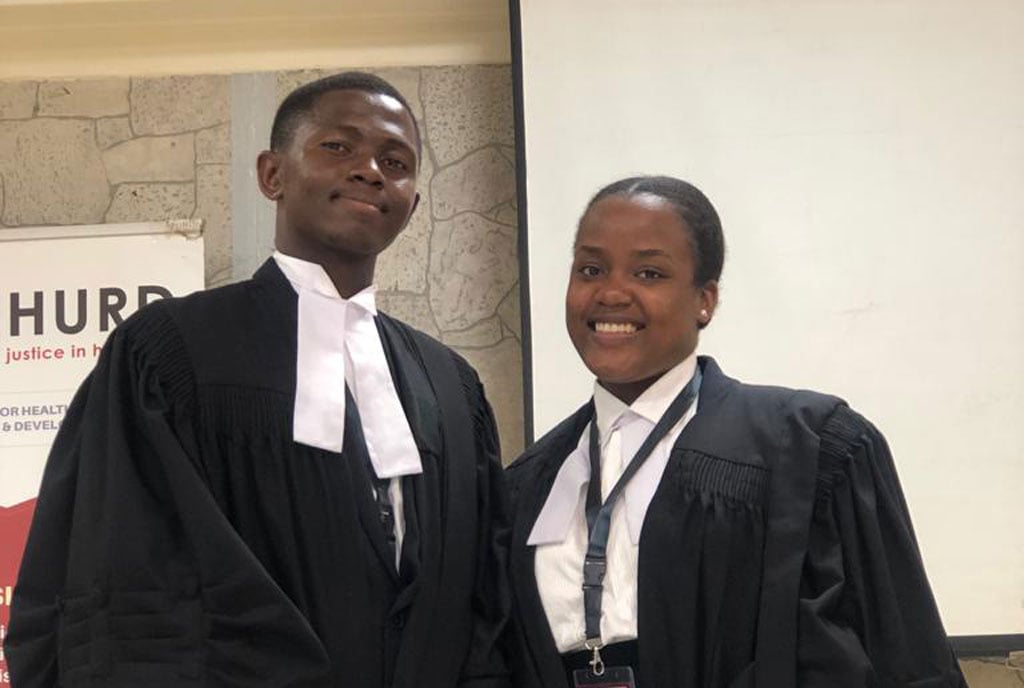Prime
Mak wins inter-university moot court competitions

Makerere University (Law School) students Mellissa Akunda Muhumuza and Amos Mumbere pose for a picture after winning the CEHURD moot 2022 on November 4, 2022. PHOTO/HANDOUT
What you need to know:
- This year’s moot court competition ran under the theme: “Gender discrimination: The plight of pregnant girls in schools.”
Makerere University on Friday beat 11 other universities to win this year’s inter-university constitutional law moot court competitions.
Makerere beat Cavendish University in the finals in Kampala to lift this year’s trophy.
“Their lordships have very carefully considered the submissions, the amount of work put in and the way the submissions have been presented and they have found that the performance has been 70 percent and above,” retired Justice Remmy Kasule, who led a panel of five justices to hear out the students’ arguments, said.
He added: “The final results are; respondents (Cavendish University) have 70.2 percent and the appellants (Makerere University) have 77.8 per cent. So it’s the team of the appellants, which is the winning team.”
The other justices on the panel, who assessed the student’s performance were; Catherine Bamugemereire of Court of Appeal, Margaret Tibulya of the Anti-Corruption Court and retired judges Wilson Kwesiga and David Kutosi Wangutusi.
Melisa Akunda, one of the participants from Makerere University, shortly after winning the competition expressed her joy for emerging as the best out of the 12 competitors.
“I feel very happy that we were able to come out as the victors of this tight competition but the idea is not about winning but for the opportunity to learn regarding sexuality, sexual health and reproductive issues. I, therefore, thank Centre for Health, Human Rights and Development for giving us this opportunity to learn,” Ms Akunda said.
Likewise, Amos Mumbere, another participant who came out as the best oralist and also the best performer with 80.2 per cent, said he had learnt so much from the moot law competition.
“I feel proud of winning the competition. This year has been an opportunity to exploit issues. It was a very interesting engagement were we researched so much before we came to present before judges of courts laws in order to give the remedies that should be,” an excited 3rd year law student, said.
A moot court or mooting simulates a real court environment to give law students an opportunity to put their learning into practice.
This year’s moot court competition ran under the theme: “Gender discrimination: The plight of pregnant girls in schools.”
The problem statement of the moot competition was that Oyanda is a landlocked African Country, bordered to the North by the Republic of Nakasa, the Federal States of Magonja in the South, Lindo in the East and Nyangwa in the West.
The COVID-19 pandemic found the state of Oyanda, like many other Least Developed Countries, unprepared.
One such victim was Ariana Kamisha, 15 -year old, who was attending Kwerro High School, a government-aided school, in Senior Two.
When the schools were reopened, one of her male teachers impregnated her. She carried out abortion and died on her way being rushed to hospital due to hemorrhage.
Ariana passed on because she had failed to get emergency care that she had sought.
A local child rights body known as PIMI prepared pleadings and filed the matter before the High Court of Oyanda against the Attorney General and Kwerro High School.
PIMI argued that the failure of the government to ensure that girls were protected from harmful and predatory cultural and religious practices and beliefs, and archaic laws is a violation of human rights guaranteed under the Constitution of Oyanda and applicable laws.
Secondly, PIMI argued that the failure of the government to pass and implement a School Health and Sexuality Education Policy is a violation of various human rights guaranteed under the Constitution of Oyanda and applicable law.
The High Court found in favour of the applicant (PIMI), holding that it was not enough for the State to simply deny accountability since it is the main protector of human rights, therefore, it had to ensure that all persons within the State were respecting human rights.
But being dissatisfied with the decision, the Attorney General appealed the same decision before the Court of Appeal and later to the Supreme Court. It’s from this moot problem statement that the law students argued the case “for” PIMI and “against” the Attorney General.
Competitors
Other competing universities were; Uganda Christian University, IUIU Mbale, IUIU Kampala campus, Nkumba University, International University of East Africa, Kampala International University and Uganda Pentecostal University.




